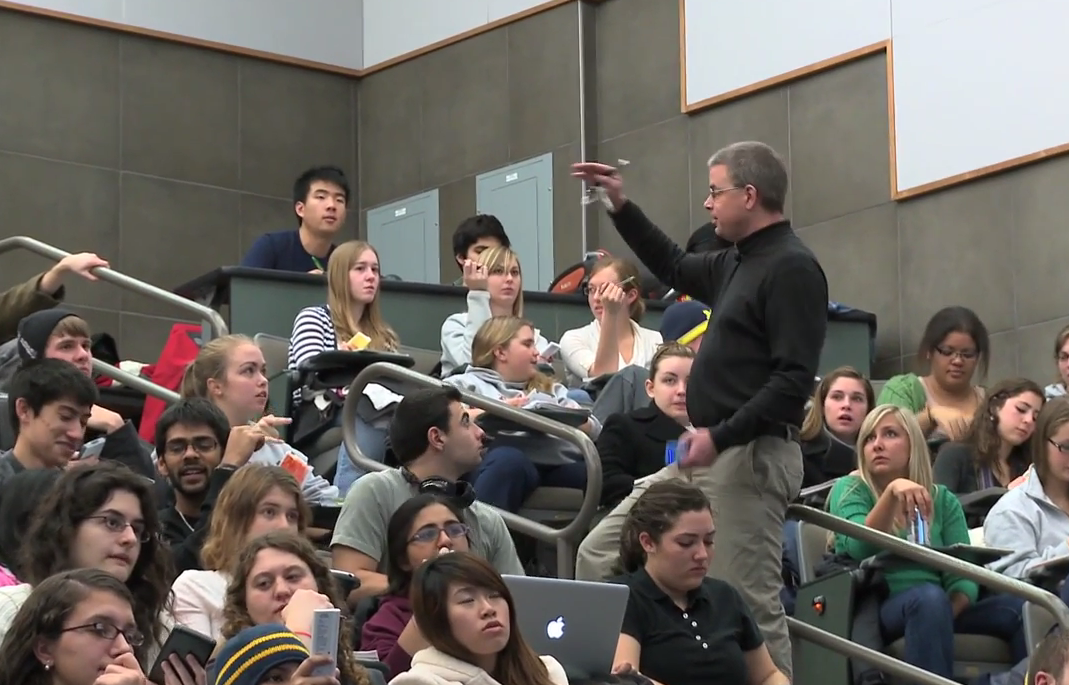
Leaders of a project to transform the teaching of STEM courses (science, technology, engineering and mathematics) in the College of Literature, Science and the Arts at the University of Michigan say it will take a culture change from within to accomplish, but they are confident the university is ready for the challenge.
The new effort, called REBUILD, will bring together faculty from physics, chemistry, biology and mathematics, with colleagues from the School of Education. Their goal is to ensure that STEM education is evidence-based, continually refined, and delivered by multi-generational teams modeled on the research groups of today. Tim McKay, Arthur F. Thurnau Professor of Physics and of Astronomy and director of the LSA Honors Program, is leading the project, which has initial support from a $2 million National Science Foundation Grant.
“There has been a lot of research over the last decades, and a lot of new technology invented, that enables us to teach introductory science in new kinds of ways—in ways that are demonstrably more effective,” McKay said. Nationally and at U-M more than half the students who come to college to major in a STEM field do not follow through, the team wrote in the proposal to NSF. The biggest drop off in participation in these majors comes when students take introductory courses, they noted.
“This grant and the program Tim and his colleagues have planned provides a terrific opportunity for U-M not only to lead in reshaping STEM education but to create a model for transforming curriculum across the university,” said Provost Martha Pollack. “In keeping with our Third Century Initiative to set a course for our next century of learning and scholarship, the REBUILD program provides faculty a chance to foster excellence and creativity in our undergraduates, as they engage students in new ways.”
REBUILD will involve 21 courses with total enrollment of more than 8,000 students each semester that will go through a three-year process of evidenced based reform. The plan, modeled after U-M’s STRIDE program, is to involve those who teach the classes at the ground level, with hopes they will be agents of this change.
STRIDE is a program that seeks to improve the campus climate for women in STEM fields, and to recruit more women into these areas. It has become a national model for how to encourage change from within.
A first goal of REBUILD is to demonstrate through research the benefits of alternate methods of teaching, away from the traditional lecture often found in courses with large enrollment. Laura Olsen, Arthur F. Thurnau Professor of Molecular, Cellular and Developmental Biology & Professor of Ecology and Evolutionary Biology, and the academic program director, Undergraduate Program in Biology, said she expects faculty even may challenge some of the research.
“It won’t be one-size-fits-all. Faculty teams will choose what works best for their courses. I am excited to see what people come up with,” said Olsen, who already had altered her courses to get away from a traditional lecture format.
“I make students much more responsible for reading the material before they get to class so that we can spend more time solving problems,” she said. “It makes a huge difference for both the instructor and the students.”
Olsen added that the NSF grant and funding from LSA and the provost’s office will allow faculty to receive help with the transformation, as intergenerational teams of undergraduates, graduates and faculty will be involved in developing new tools to transition courses.
Another member of the team, Stephen DeBacker, Arthur F. Thurnau Professor and Mathematics who was Michigan Professor of the Year in 2012, said his department has been teaching precalculus and calculus courses in “an engaged, interactive manner since the early to mid 1990s,” and it appears to have paid off with an increase of students interested in the field.
“The evidence we have is that what we do here in certain classes works,” he said.
“I think that every instructor in Math values teaching and learning and tries to teach well, albeit in his/her own way. Engaged teaching requires an investment in people, not necessarily technology.
“For a program like this to succeed, there are a number of key things that need to happen, and some of them are tricky to implement: Instructors must be invested in teaching well in an interactive manner (and this includes recitation instructors, etc.), new and old instructors must be trained, good people must be hired to administer the programs and maintain consistency from year to year, and how well it is all working must be assessed.”
The program officially begins in January 2014, and McKay said the first nine months will be spent with teams of faculty from STEM areas and the School of Education pouring over the research. Planning for how to implement changes also will occur during this period, which will involve helping each department set targets. He expects the first noticeable changes in the classroom will occur in Fall 2014 and continue to roll out.
“This is a three-year project, so we really aim to have made significant change in all of the large introductory science and math courses by the end of three years. That’s not to say the process will end there, but we have a particular period of time and a particular goal here that we really want to take advantage of, and make sure that during this period we make a big shift.”


